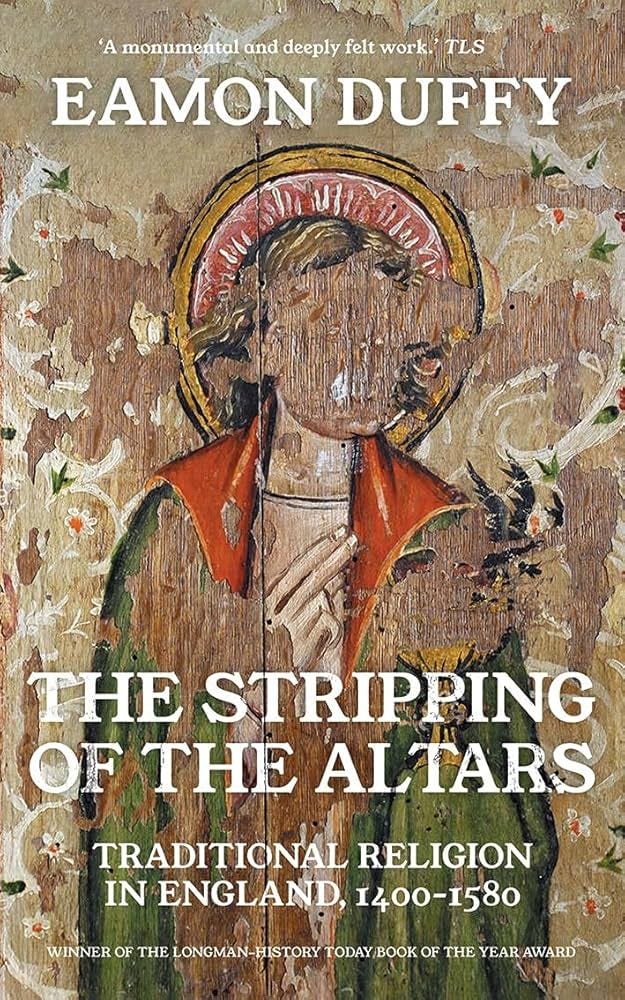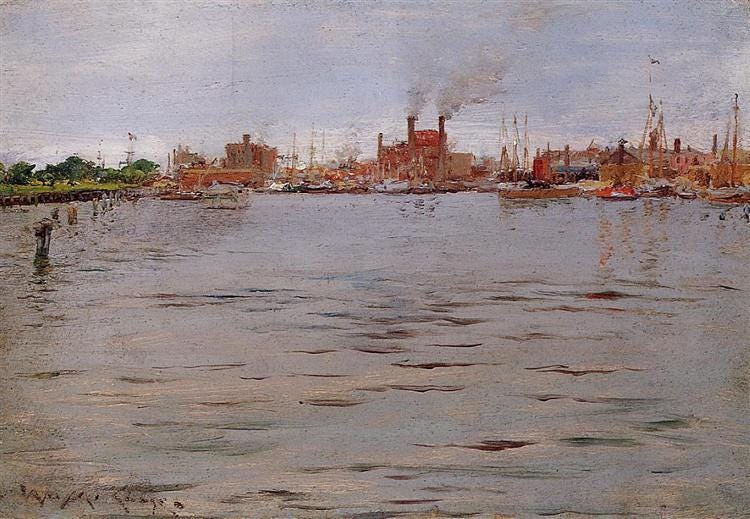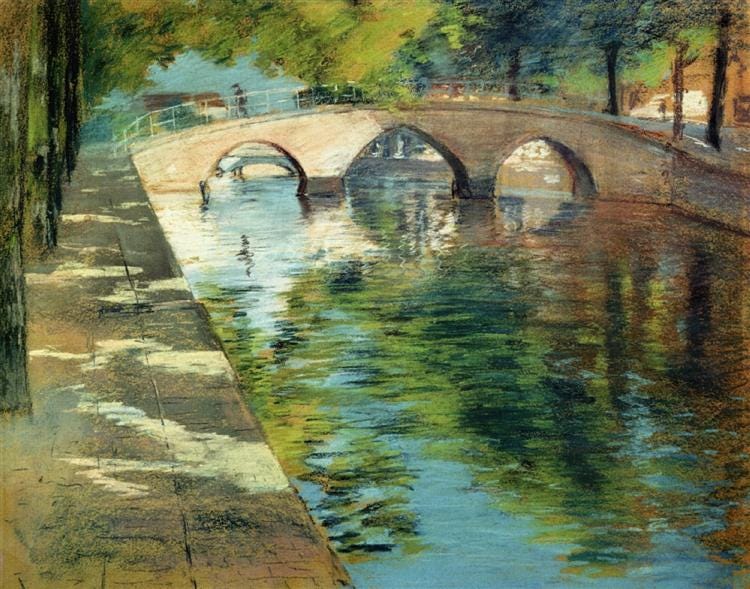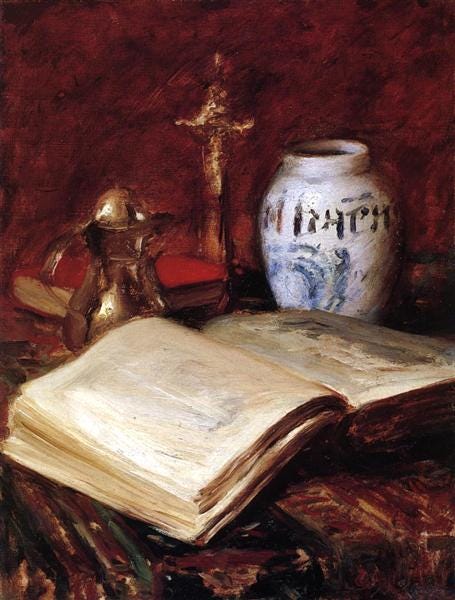Week 13 (2025)
individual vs. collective reading, in-between waiting, marriage, industrialism & the chances we had, sexuality & biotech in the public realm
Click title to open in browser. You can reply directly to this email if received in your inbox.
to read: books
The Stripping Of The Altars — Eamon Duffy — Picked this up at the recommendation nudge of
/ / whom I eavesdropped on (and would by lying if I said I didn’t also take note of a couple books not already on my radar, from Nate’s list here.) In a nutshell: it was a lot for a newbie. Additionally, I found myself not particularly enamored with any of the goings-on or players involved, so to speak. Perhaps that’s how much of history goes.
Robert Ombres, O.P with this older review:
“What cannot be in doubt is the scale of his achievement, the value of the evidence he has assembled, and the effectiveness and eloquence with which he argues his positions. Duffy ends with a quotation from Utopia by More, whom he describes as the wisest man in England. It advises on how to survive in troubled times, and it leads Duffy to reflect on how all over England decent, timid men and women set themselves to do just that. lt was not for them to rule the winds: the conscience of the prince was in the hands of God, and the people must make shift to do as best they could under the prince.”
Eamon Duffy reflecting on the work 30 years on:
“The myth of neutral history is just that: a myth. If it actually existed, no one would want to read it. Every historian brings to their subject-matter a raft of experience, opinions, attitudes and assumptions that inform their perceptions, and influence both the issues they find interesting, and the questions they bring to their material. History is an attempt to discern the patterns that underlie the surviving traces of the past, not a bloodless chronicle of patternless events, and the interpretation of the records of the past demands personal gifts like imagination and empathy.”
to read: essays, articles, newsletters
It Is Not Good To Read (Only) Alone —
, Front Porch Republic — “Put simply, the debates over whether audiobooks should count as reading or not reveal the default individualistic mentality that we, children of (post) modernity, apply to reading. In other words, whatever medium we use for ingesting books today, the overwhelming assumption is that we’re doing it alone… history shows that reading at its best used to be much more communal than individual—because the function of the earliest literature was to bring people together rather than give them a delight to hoard all to themselves.”(related: In Praise Of Reading Aloud and The Read-Aloud Family, shared previously)
- , Hearth & Field — “This discomfort, this impatience, this late waiting and the penances and paradoxes may be trying or confusing, but really, it is right that this time of preparation and patience should contain both hardship and flashes of joy and light. It should not surprise us that this in-between time is not just one thing. For like the spring, the path to new life comes slowly and unpredictably; but we are not alone within it.”
(late in pregnancy, uncomfy and anticipatory in more ways than one—fittingly during the springtime lenten season—this piece was a balm to me)
Hobbled — Jesse Baker,
—“To which his God responded, Child, you’ll learn
My blessing only comes upon the broken,
Upon the ones who’ve sought to bend my will
To theirs. They all leave marked, and sometimes bruised,
But always hobbling; so when they walk
With stuttered steps, they’ll learn to lean on me.”
- , Granola — “How do we decide what is a good chance and what is a bad chance? Greater formal education can be a wonderful thing. But it’s no guarantee of a happy life. Those with PhDs can still suffer and struggle. As to wealth, it makes a lot of things easier, and a lot of us wish we had it. But wealth brings its own hardships, and it often just makes us hungry for more wealth. Every chance brings its own challenges. And so, in the end, there’s not necessarily good or better or bad chances, Nathan suggests to us. There is just ‘the chance you had.’”
(related: An Education In Thanksgiving, Hannah Coulter The Green Lady And Me, ’s No You Cannot Have It All, and of course her book Uprooted, shared previously)
Sexuality After Industrialism — James Wood, Mere Orthodoxy — “I would like to conclude with a challenge: Suppose the economy would be less productive, and our societies less prosperous in monetary terms, as the price of our regaining harmony between men and women. Would it be worth it? Economic growth for its own sake and at all costs is inhuman. It is the logic of cancer, not of a healthy human society.”
(to be fair… Reep Cheep did make some valid points in the comments which speak to my qualms with broad brush generalizations and optimistic views about “getting back to pre-industrial times” with the work/home integration of a household economy: “I can always tell the location of people who write these kinds of things… They've never had dads who were seamen, travelling tradesmen, soldiers, remote miners, emigrants giving remittances, etc. The picture of the Christian household as a quiet little place where mom and dad are together all the time, happily producing some good or service in tandem, is historically almost an anomaly. It is the Wendell Berry farmer nostalgic view of the family culture of Christendom… It's precious, it works okay for a select few farm mavens, but just ain't true.” // Maybe we do overestimate how this realistically played out (and can play out) for the average couple or family? As mentioned in the comments of one of ’s posts, there’s a huge difference in say, physically farming, blacksmithing, or shopkeeping alongside your whole family and… doing independent intellectual work while staring at a laptop, but getting to do it at home and often still needing childcare… due to all the laptop work. Though it’s an imperfectly flexible solution for some! Others take a modern family business approach (outside of farming) which still requires a uniquely concerted effort and isn’t easily going to work for everyone, as suggested in the comments of ’s post here. // These realities don’t negate my appreciation for the piece, or Ross’ phenomenal essay linked below. Perhaps every time period has its own particular challenges and opportunities for the sexes and the family unit. Any stories of inching toward solutions - and contentedness despite imperfect circumstances - are hopeful enough for me.)
- , Patient Kingdom — “…equality is a fickle measure of love and is often at cross-purposes with it. As a measure of political health, it functions quite well; as a measure of relational health, less so… In a word, membership (or partnership) is the unity we were made for. Love makes us one, not primarily by balancing our distinct interests, but by inviting us to lose ourselves through mutual submission and find ourselves as members of something bigger than ourselves. This is most true in the church, of course, but marriage is a kind of microcosm of this same fellowship.”
(also from him: A Parish Manifesto (audio reading here) and Against Cremation, shared previously)
one for the [desecrated] body and two for the [female] body (though the line between the two buckets can get blurry, and perhaps that ought to be instructive):
- , First Things — “Where sexual mores were concerned, this ethic aimed to discipline and guide our unruly passions using tools such as norms, proscriptions, and social pressure. And the point at which this ethic was overtaken by the technological one as the pre-eminent public means of managing sexual desire was the FDA’s 1960 licensing of the Pill. From then on, questions of desire, family formation, fertility, and all that follows were to be treated as matters for neutral technological management and free individual choice.
It is no coincidence that the Pauline distinction between licit sexuality and porneia began to crumble at this point, nor that the 1970s are known as the “Golden Age of Porn.” More profoundly, too, as the Pauline distinction collapsed, so did the Christian ordering of sexuality to the human end of creating human life. With this dis-ordering of desire came, instead, its detachment even from recognizably erotic ends, toward, in many cases, something more like a compulsive and ever escalating violation of taboo, ordered only to individual whim and commercial profit.”
Biotechnology Against Privacy —
, Comment — “…the matters we jealously guard as private have public consequences that we are ill-equipped to handle. In short, Christians and others with ethical concerns about new biotechnology ought not to be frightened out of political engagement and policy argument by invocations of the public-private distinction, which collapses in its usefulness when applied to medical and biological technologies that transcend that very distinction.”Treating Infertility: The New Frontier Of Reproductive Medicine — Ethics & Public Policy Center — Well, well, well if this isn’t the perfect collaborative endeavor to encompass a good chunk of what I’ve been trying to get at here (with some familiar, overlapping contributors). Our approaches to the complexities of the fertile body come with both acute and widespread physiological, social, and moral ramifications. What a gift that this collective effort was accomplished to explain as much. I’ll be reading through sequentially. This week: Introduction To Restorative Reproductive Medicine by Natalie Dodson — “Infertility is not a disease or condition. Instead, it is a symptom of underlying reproductive dysfunction and can often present with other symptoms.”
to watch, listen to
Continuing On:
(more resources on female embodiment in the Big Ol' Compilation)
The Natural Womanhood Podcast with
— Season 3, Episode 5 — TempDrop 10 Years Later: A Conversation With Inventor Michael Vardi — I’ve enjoyed it so much I even have a referral code if you want to purchase. :)Woven Well Podcast with
— Episodes 50-51 — Client Story: Leslie (Honeymoon Baby) and How Important Are Our Bodies, Really?“What I learned the most is that my fear of getting pregnant unexpectedly was really a fear of being out of control. I realized that a lot of the time I trust the Lord like 95%… with things other people would look at like ‘that’s too much for me’… but in having a baby it was ‘I don’t know if I can trust you with that.’”
related:
’s recent In Praise Of The “Whoopsie” Baby, which, seeing as she draws a readership including those outside the Christian sphere, was especially intriguing—heartening, even—to read the comments and restacks of. Always appreciate her perspective, considering everything she’s personally experienced in the past and where she’s currently at professionally as a postpartum nurse.
and ’s kind advice to PhD-minded (and other) mothers, including these points: “You can’t control your fertility (even if you are using birth control) or who your children are or what they will need from you. Have the babies and trust. You can influence things like your health and community support and income, but you can’t control those either.”
to glean from: tip, product, resource
Dirt Tips solicited from
— We, too, have multiple boys and no mudroom. Even if there’s no magic solution, reading the responses was weirdly cathartic.Smoothies — A reminder that you can just… make these with a few ingredients (I need the periodic reminder). An easy way to get a dose of nourishment and nutrients in a creatively tasty way.
Baskets — At the risk of going full Influencer Mom on you, did you know you can buy baskets at the thrift store to hold all kinds of random objects? And you and your kids will find all sorts of uses for them? I’ve been on this train for a few years and have them everywhere. Seriously, one can never have enough pretty-yet-insanely-cheap baskets. The sizes, shapes, and uses are endless! (Who are the people dumping them off at thrift stores??)















There’s a plethora of good things here I want to read but just wanted to say I’m enjoying your brief reflections on some of the pieces. It’s like getting to peek into your intellectual/ spiritual journey in real time, which can be a gift to others. (Of course I’m sure there is much more going on than is shared! As it should be - all in moderation etc etc.)
Can't believe you already finished the Duffy book! It took me years to actually finish lol. I see how it could be a firehose, especially in a quick read. He definitely assumes his readers have a good understanding of Catholic liturgy, practices, terminology etc.
I think it’s useful to get a broad overview of the reformation as well as particular close ups, especially because it was carried out so differently in different places. Ex: Where the German reformation had a populist bent, the English reformation was extremely top-down/political.
Also, it’s tempting for Catholics to De-emphasize corruption before, and Protestants to De-emphasize corruption/iconoclasm that happened in the execution.
It is such a complex period that obviously still impacts us so much today. I'm sure you are probably Reformationed out rn, but Brad Gregory’s Unintended Reformation is also really interesting.